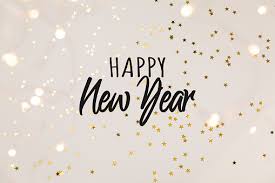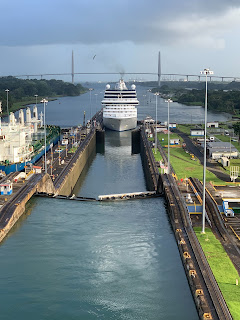This blog contains the content of several emails that I sent to
a select group of family and friends. The emails were sent to family members
who wished us well or friends who said things like, “Take a lot of pictures,”
or “Looking forward to hearing about your trip.” Honorable mention goes to Wes
and Mary who took this cruise on this same ship, Holland America’s Eurodam, two
years ago and to John and Marilyn who will be taking it next month.
Day One, Saturday, December 4, 2021
We have a 5:00 AM early morning pickup by Stephen and Lisa. They
get us to the airport with time to spare. Marlene has made fresh sausage
biscuits that we enjoy along the way. United Air flights to Fort
Lauderdale are on time. By about 1:00 PM we are picking up our luggage,
grabbing a Starbucks, and heading to the shuttle pickup area to catch a ride to
the hotel.
Hotel reservations are for the Ramada Fort Lauderdale Air/Cruise
Port Inn. Such a deal: free airport/cruise port shuttles and a complementary
breakfast. Only two blocks away is the Rendezvous Marina Restaurant. On the way
to dinner, two geckos scurry across our path and a congregation of ibises
forage in a grassy area. The restaurant is amazing. We get an outdoor patio
table overlooking the marina, temperature is in the seventies, and we have one of the best fried clam strip dinners ever.
Day Two, Sunday, December 5
The 10:00 AM shuttle to the cruise port is running a little
late. The hotel has a well-qualified shuttle coordinator whom I think of as
“Big Bob the Bouncer.” He is also part drill sergeant: “Keep back from the
incoming vans, folks, These people just got in from the airport.” “Eurodam
people stand here. If you are on the Edge, line up here. Stay in line. Keep it
tight…”
By 1:00 PM we are on board the Eurodam. Nice cabin with a
balcony and, for the first time in my memory, we even have a bath tub… Thank you,
Elaine. The ship gets underway at 5:30 PM. We opt for a steak dinner at Lido
Marketplace and in the evening go to a program that surveys and celebrates the
150th anniversary of the Holland America Line: a history of moving cargo,
providing immigrant passage, transporting troops during WWII, and now
specializing in vacation cruising.
Day Three, Monday, December 6
The ship stops at Half Moon Cay (Bahamas), Holland America’s
private island. We stay on board and use the time to explore the ship and get
into shipboard life: reading on our balcony, attending High Tea, and enjoying
food galore. (We have already had steak, jerk pork, omelets to order, salads,
fresh fruit, salmon, and swordfish, yum, yum.) The day ends with a comedy show
in the Mainstage Theater.
Day Four, Tuesday, December 7
This an “At Sea” day on the way to Willemstad, Curaçao;
temperature in the high seventies, calm seas, average speed of 22 knots. One of
my favorite things about cruising is seeing hundreds of people reading, books
and tablets everywhere. Another favorite is the evening entertainment. The
program tonight was a steel drum band named, “Caribbean Magic.” With high
energy and breathtaking (literally) enthusiasm, they regaled us with
“classics,” from Andrew Lloyd Weber to Tchaikovsky and Schubert.
Incredible!
Day Five, Wednesday, December 8
Willemstad, Curaçao is our port of call today. A former Dutch
colony, it is known for having one of the world’s largest floating pontoon
bridges and a row of quaint Dutch-looking houses painted in bright Caribbean
pastels.
In the afternoon and early evening, we walked around the
shopping area of Willemstad. I went into a store displaying traditional blue
and white delft tableware. Just as I was beginning to be intrigued by these
dishes, a little voice inside my head said, “What are you doing? You can buy this
same stuff in Holland, Michigan.”
Day Six, Thursday, December 9
Oranjestad, Aruba has a look and feel similar to Curaçao,
perhaps not as quaint. There is a free trolley ride that does a loop around
town. It gives a great overview, including stops for shopping and at least one
museum.
All Aboard the ship was 4:30 PM. After dinner in the main
dinning room, we hit several music-related venues. We started with a
performance by a dance company on Mainstage, then went on to a piano
performance (two grand pianos playing contemporary hits) and ended up at “B.B.
King’s Blues Club.”
Day Seven, Friday, December 10
We are at sea all day, on the way to the Panama Canal. Ever
wonder how to spend the time on board? Here is how we do it.
7:00 AM: Breakfast - Lido Market dinning hall
8:00 AM: Reading and writing in the Crows Nest Lounge and Cafe.
Enjoying Starbucks-style lattes on the 11th (top) deck with spectacular ocean
views.
10:00 AM: Cooking demonstration by the ship’s Executive Chef -
emphasis on fresh seafood. (I learned that the swordfish steak I had the night
before was freshly caught off Curaçao and delivered directly to the ship.)
11:30 AM: Lunch at Lido Market, Asian cuisine, we go for
California sushi rolls, curry shrimp, and chicken Marsala.
2:00 PM: The Art of Flower Arranging (Marlene)
3:00 PM: Meet the Artists - Q and A with performers from the
steel pan group, “Island Magic.”
5:30 PM: Main Dining Room - crab cakes for the appetizer, prime
rib main course!
7:00 PM: Masterworks by Brahms, Lincoln Center Stage
9:00 PM: Comedian Ken Boyd, Mainstage
In between the above activities we take time for reading, tea,
naps, and exercise (walking) on the Promenade Deck (deck 3).
Day Eight, Saturday, December 11
This is our day at the Panama Canal. The ship is lined up to enter
the Canal area at 6:00 AM. It is a major event. Most people are up and on the
bow, deck 5, or forward, deck 7. Holland America has a tradition of serving
rolls, coffee, and juice on the decks at that time. The warm mango-infused
rolls are referred to as “Panama Rolls.” The Cruise Director says that the same
rolls, when the ship goes through the Suez Canal, are called “Suez
Rolls.”
The ship goes through the first three locks into Lake Gatun, drops
off passengers for shore excursions, returns through the same locks, and picks
up shore excursion passengers in Colon 8 hours later. A day earlier, a bulletin
had been delivered to all state rooms that warned about the extreme heat and
humidity in the Canal area. We decide to cancel our shore excursion, stay on
the ship, and view the return trip through the locks. Good decision. I loved
getting a second view of the locks. This time, I moved around the ship to see
the locks from different perspectives; including evidences of the original
French attempt, the current locks, and the new locks. I was especially
intrigued by the “mules.”
Mules are electric train engines that keep the ship straight while
going through the locks. Each mule costs about 2 million dollars and weighs
fifty tons. It takes eight mules to guide our ship, two on each side forward
and two on each side aft (picture to follow).The mules are essential because
our ship has only two feet of clearance on each side. Mules do not push or pull
the ship; they merely keep it straight and from scraping the sides. The ship’s
own power moves it forward.
These electric locomotives run on five-foot wide tracks, with a
third underground rail providing electric power towing assistance by means of an
underground cog wheel system.
I love the concept that in the Canal ships have the power to move
themselves forward, but they need mules to keep them straight. I wonder if
there are situations in our lives like this. We are moving forward, but to be
safe we need to be connected to Scripture, people, or other resources to keep
us on a straight path and to avoid getting all bruised and scraped.
Days Nine - Twelve, December 12 - 15
The Panama Canal, for us, was the high point of the cruise. We
enjoyed staying on board ship for the stops after the Canal at Colon and Costa
Rica. For the remaining days we shared wonderful times together: great meals,
musical performances, board games, an informative talk by the captain, movies,
and reading. There was one unique experience while at sea.
At about 2:00 AM one morning, Marlene woke me up for help with a
problem. Earlier, she had fallen asleep while listening to an audiobook with an
ear bud in her ear. When she awoke, the ear bud was gone. The disappearance was
compounded by the multi-layered sheets and blankets and pillows being the same
color as the ear bud - white.
The search began. We removed, turned over, and shook out the
sheets and pillow cases - nothing. We stood the mattresses and bed frames on
end and removed the suitcases from under the bed - still nothing. Finally, we
shut off the lights and with the beacon of my iPhone, I combed the floor, under
the sofa, and around an end table. And, then - something! A glint of white
caught my eye from between the end table and the wall. Could it be? Yes! Barely
visible, it reflected back at me in the darkness. Rescue made. The lost was
found. We put the room back together, and I was off to sleep by about 2:30 AM.
Why have I told you this story? Because, in addition to being
thrilled to find the ear bud, I also noticed that no matter where I looked,
everything was spotless, no dirt or even dust. It is a tribute to the good work
of our room stewards. I wonder if I could do a better job in keeping the nooks
and crannies of my life clean.
Final Observations and Comments
—The food is consistently excellent, breads and pastries
freshly baked daily, seafood picked up at the various ports. My favorite foods:
made to order omelets at Lido Market, prime rib or swordfish steak or short
ribs in The Dining Room.
—My favorite hangout place is the Crows Nest, on the
Observation Deck (deck 11). The spot has a cafe, library, tables, lounge
chairs, and the best views.
—Health precautions are applied consistently, especially
masks and sanitation. We are not aware of any Covid, flu, or virus outbreaks.
—The Internet is unpredictable. We were able to occasionally
receive and send email. Best of all, we were able to get the worship service at
Fellowship Church on Sunday morning. Shortly after the church service, the
Internet crashed and we lost service for about 24 hours.
—The population of guests is about sixty percent of
capacity. There is plenty of seating at meals and in the auditoriums, and
elevators respond quickly.
—Ship statistics: Eurodam launched in 2007, length 936
feet, beam 106 feet, top speed 23. 9 knots or 27.5 MPH, guest capacity 2,106
(1,350 on this cruise), crew 929.
---This was another excellent cruise. We are
thankful to have been spared from illness or transportation delays. Son Stephen
picked us up from Grand Rapids airport at around 6:00 PM, Wednesday, December
15, 2021.






